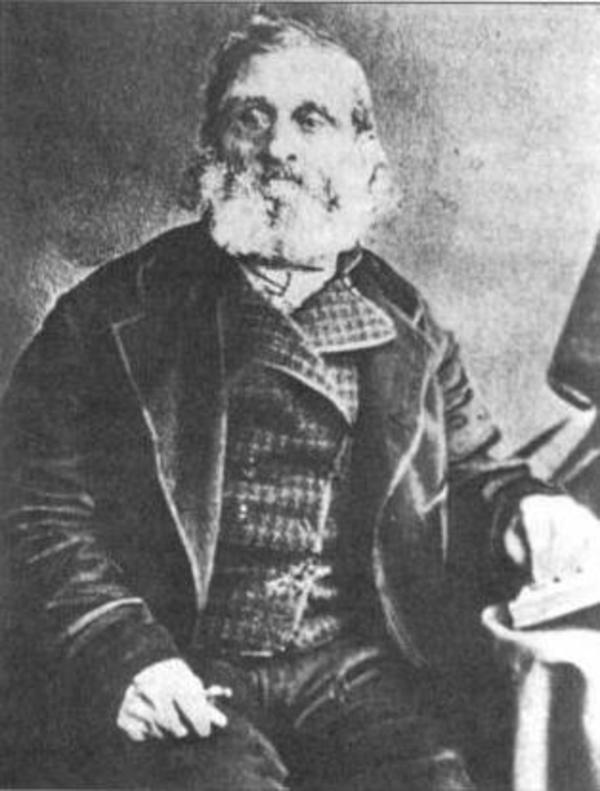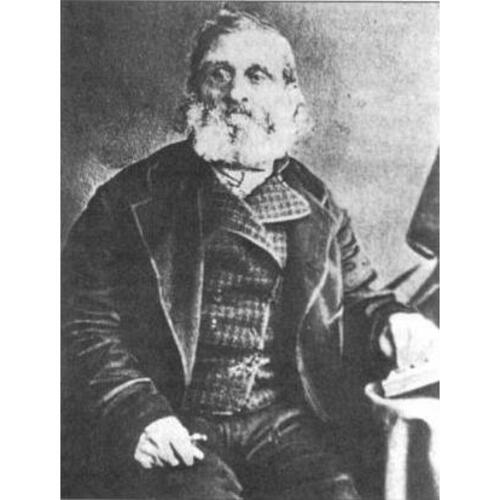
Source: Courtesy of Wikimedia Commons
ABBOTT, WILSON RUFFIN, businessman; b. of a Scotch-Irish father and a free Negro mother in Richmond, Virginia, in 1801; d. in Toronto Ont., in 1876.
Wilson Ruffin Abbott was in his youth apprenticed as a carpenter but left home at 15 to work on a Mississippi River steamer as a steward. Seriously injured when cord wood fell upon him, he was nursed by a Boston traveller’s maid, Ellen Toyer, whom he later married. He then moved to Mobile, Alabama, where he opened a general grocery store. The Abbotts were indignant when the city required all free Negroes to provide bonds signed by two white men in pledge of their good behaviour. In 1834, receiving an anonymous warning that his store was to be pillaged, he withdrew his savings, put his wife and two children aboard a steamer for New Orleans, and slipped away alone on the night his store was attacked. After a brief sojourn in New York, the Abbotts moved to Toronto in late 1835 or early 1836, one of hundreds of American Negro families to seek a greater degree of freedom in Upper Canada at this time.
After a false start as a tobacconist, Abbott became a dealer in properties and increasingly made his mark in real estate; although he could not read until his wife taught him, he was known for an unusual ability to do complex calculations in his head. By 1871 Abbott owned 42 houses, five vacant lots, and a warehouse, largely in Toronto, but also in Hamilton and Owen Sound. He helped purchase freedom for fugitive slaves, kept his wife’s sister, Mary, as a housekeeper on wages, and aided another sister-in-law, Jane, who married A. H. Judah in Toronto.
As the Abbotts’ fortunes grew, they took an increasing interest in public affairs. Abbott served in the militia during the rebellion of 1837. In 1838 he was one of six organizers of the Colored Wesleyan Methodist Church, aiding in the purchase of property for it. He supported the Anti-Slavery Society of Canada under the Reverend Michael Willis, was elected to the city council from St Patrick’s ward, which he carried by some 40 votes, and served as a member of the central committee established in 1859 by the Reformers in Canada West. In 1840 Mrs Abbott helped organize the Queen Victoria Benevolent Society to aid indigent black women, and in later years she was active in the British Methodist Episcopal Church.
The Abbotts had four sons and five daughters. One son, Anderson Ruffin*, would become the first Canadian-born Negro to receive a licence to practise medicine. Through him, the Abbott family would become linked with another distinguished Toronto Negro family, the Hubbards, and it would be Anderson who would urge William Peyton Hubbard* to enter politics, in emulation of his own father.
Wilson Ruffin Abbott was unusual in being a successful black businessman and politician in the late 19th century. Toronto, and Ontario, had once had a substantial Negro population, but this had fallen off after the American Civil War until there were perhaps not more than 2,000 Negroes in Toronto where once there had been reported to be three times as many. By the latter part of the century, prejudice had expressed itself against black men in a variety of ways in the province, and most Negroes went to segregated schools and separate churches. In Toronto, however, the virus of anti-black prejudice spread less deeply: Knox Presbyterian Church would place a visiting Negro in the pulpit, on occasion other black men would achieve at least modest successes in business, and Toronto’s schools were never segregated. Abbott did not encounter any serious discrimination, even though Negroes elsewhere in the province did; thus, his experience was not a typical one. His undoubted abilities no doubt helped offset most of the residual prejudice he may otherwise have met.
MTCL, Hubbard-Abbott collection. Evening Telegram (Toronto), 17 May 1911. Globe (Toronto), 11 Dec. 1847. R. W. Winks, The blacks in Canada; a history (Montreal, 1971). D. G. Hill, “Negroes in Toronto; a sociological study of a minority group,” unpublished phd thesis, University of Toronto, 1960; “Negroes in Toronto, 1793–1865,” Ont. Hist., LV (1963), 73–92.
Cite This Article
Robin W. Winks, “ABBOTT, WILSON RUFFIN,” in Dictionary of Canadian Biography, vol. 10, University of Toronto/Université Laval, 2003–, accessed April 1, 2025, https://www.biographi.ca/en/bio/abbott_wilson_ruffin_10E.html.
The citation above shows the format for footnotes and endnotes according to the Chicago manual of style (16th edition). Information to be used in other citation formats:
| Permalink: | https://www.biographi.ca/en/bio/abbott_wilson_ruffin_10E.html |
| Author of Article: | Robin W. Winks |
| Title of Article: | ABBOTT, WILSON RUFFIN |
| Publication Name: | Dictionary of Canadian Biography, vol. 10 |
| Publisher: | University of Toronto/Université Laval |
| Year of revision: | 1972 |
| Access Date: | April 1, 2025 |



